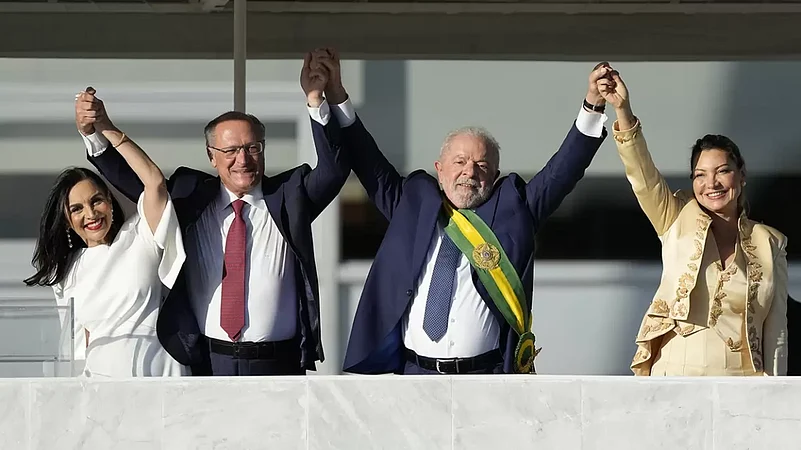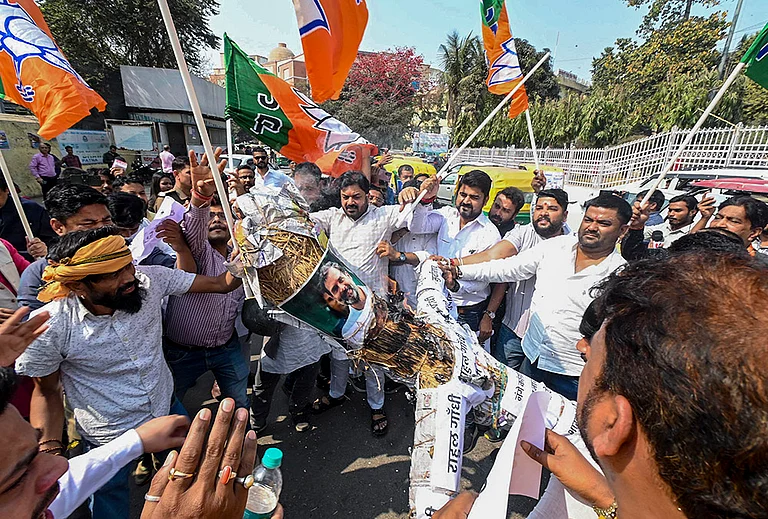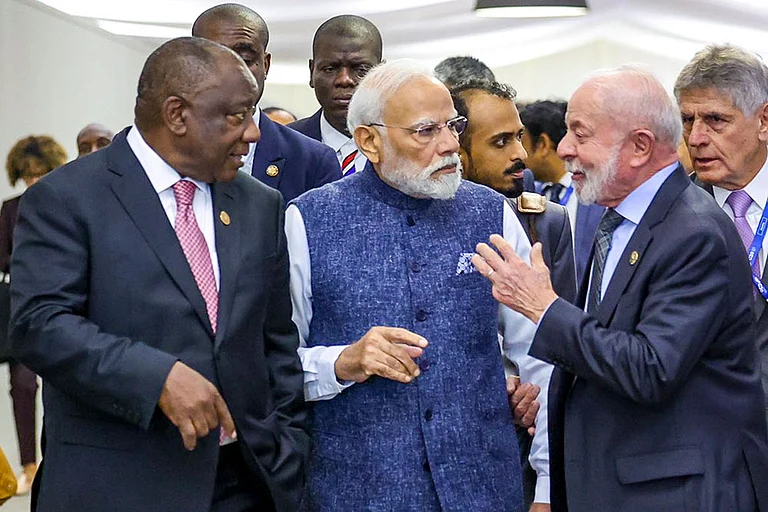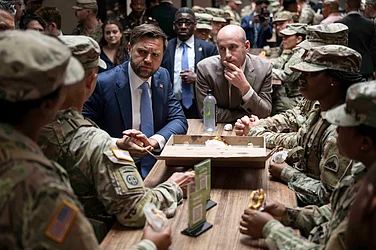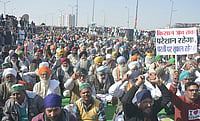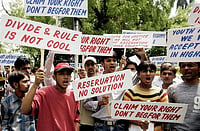Brazil's leftist leader Lula da Silva was sworn in as the President of Brazil on Sunday.
Lula defeated his predecessor Jair Bolsonaro narrowly in the elections earlier this year. This is his third presidential tenure.
Though he emerged victorious, the margin of 2 per cent of Lula's victory was narrowest in three decades. He also faces issue of denial of election results by a section of Bolsonaro's supporters.
Following his swearing-in, Lula in first actions as the President of Brazil reversed some of Bolsonaro's decisions. He also pledged to work on economic revival and holding Bolsonaro's administration accountable for their actions in power.
The 2022 Brazilian elections were considered to be critical as Bolsonaro and Lula presented very different vision for the country. While Bolsonaro is on the far-right of the political spectrum, Lula is a lefist and a unionist who also expanded his coalition by embracing moderates.
Who is new Brazilian President Lula da Silva?
Lula's complete name is Luiz Inacio Lula da Silva. He was President of Brazil twice earlier during 2003-11.
Lula secured 50.9 per cent of votes against 49.1 per cent secured by Bolsonaro.
Lula comes from a working class background and a political career rooted in workers unions. He has no formal education is the only President of Brazil to have a working class background.
During his growing-up years, Lula worked as a shoe-shine boy, street vendor, and factory worker, according to The Britannica Encyclopaedia.
Lula joined union politics full-time in 1972. He was elected the President of Metalworkers' Union in 1975.
"That post [Union President] brought him national attention as he launched a movement for wage increases in opposition to the military regime's economic policy. The campaign was highlighted by a series of strikes from 1978 to 1980 and culminated in Lula's arrest and indictment for violations of the National Security Law," says Britannica.
Lula founded the Workers Party and first ran for political office in 1982.
Lula's political career, road to comeback
Lula first became President of Brazil in 2002 in his fourth presidential bid.
Previously, Lula ran for presidency unsuccesfully in 1989, 1994, and 1998.
Lula's policies brought millions out of poverty. However, a corruption scandal later in his career led to his downfall and even imprisonment.
One of Lula's major policies was the internationally-acclaimed the Programa Bolsa Família (PBF). It's a cash-transfer scheme which provided cash to Brazilian families upon the fulfilment of certain conditions:
- Teenage children going to school
- Vaccination of children
- Monitoring for pregnant women
- Remedial education for children
- Avoiding child labour
The World Bank data shows that, together with Social Pensions sheme, the PBF accounted for a 58 per cent decline in extreme poverty, a 30 per cent decline in poverty, and a 41 per cent fall in inequality between 2004-14. It also shows that the PBF scheme rose school attendance of teenagers to 91 per cent.
Lula was succeeded as President of Brazil by his Chief of Staff Dilma Rousseff. In Rousseff's tenure, a corruption scandal led to Lula's downfall.
"Dozens of high-level businesspeople and politicians were indicted as part of the widespread investigation into the scandal. In August 2015, the list of those arrested expanded to include José Dirceu, who had served as chief of staff for Lula from 2003-05," notes Britannica.
In 2016, Lula was also accused of money laundering. Within a year, he, his wife, and six others faced six corruption cases.
In 2017, Lula was convicted and was handed a 10-year imprisonment, though he only served 580 days in jail, as per CNN.
In 2019, Lula walked out of jail and his conviction was anulled by the Brazilian Supreme Court in 2021. This paved the way for his reelection campaign.
How did Lula defeat Bolsonaro?
Contrary to Bolsonaro's hardline stance, Lula presented the liberal vision for Brazil.
Among others, Lula made the following promises:
- Priority to tackle low growth, inequality, and hunger crisis
- Increase in conditional cash transfer scheme
- Expansion of housing scheme
- Removal of policies of Bolsonaro opening Amazon rainforests to logging
- Tax reform and increase in minimum wage
- Expansion of electricity and running water access to rural areas
Lula also sought the support of moderates and right-wing leaders opposed to Bolsonaro in his campaign.
The CNN reported, "He has built a broad alliance including several politicians from the center and center-right, including historical opponents from the PSDB, Brazil’s Social Democrat Party. Among these politicians is his vice-president, former São Paulo governor Geraldo Alckmin, who has been cited by the Lula camp as a guarantee of moderation in his administration."
What lies ahead for Brazil under Lula?
Lula in his first address expressed optimism about plans to rebuild while pledging that members of Bolsonaro's administration will be held to account.
“Our message to Brazil is one of hope and reconstruction. The great edifice of rights, sovereignty and development that this nation built has been systematically demolished in recent years. To re-erect this edifice, we are going to direct all our efforts,” said Lula.
Lula will have to navigate more challenging economic conditions than he enjoyed in his first two terms, when the global commodities boom proved a windfall for Brazil. In the last decade, Brazil's economy plunged into two deep recessions — first, during the tenure of Lula's handpicked successor Rousseff's, and then during the pandemic — and ordinary Brazilians suffered greatly.
Lula has said his priorities are fighting poverty and investing in education and health. He has also said he will bring illegal deforestation of the Amazon to a halt. He sought support from political moderates to form a broad front and defeat Bolsonaro, then tapped some of them to serve in his Cabinet.
In his first act as president on Sunday, Lula signed a decree to tighten gun control and set a 30-day deadline for the comptroller-general's office to evaluate various Bolsonaro decrees that placed official information under seal for 100 years. He also signed a decree that guaranteed a monthly stipend for poor families and reestablished the mostly Norway-financed Amazon fund for sustainable development in the rainforest.
Challenges to Lula's presidency
Given Brazil's political fault lines, it is highly unlikely Lula ever reattains the popularity he once enjoyed, or even sees his approval rating rise above 50 per cent, said Maurício Santoro, a political science professor at Rio de Janeiro's State University.
Furthermore, Santoro said, the credibility of Lula and his Workers' Party were assailed by the sprawling corruption scandal.
Lula and his supporters have maintained he was railroaded. Others were willing to look past possible malfeasance as a means to unseat Bolsonaro and bring the nation back together.
There is also the element of election-denial by Bolsonaro supporters.
Lula's presidency is unlikely to be like his previous two mandates, coming after the tightest presidential race in more than three decades in Brazil and resistance to his taking office by some of his opponents, political analysts say.
Many have gathered outside military barracks since the election results, questioning results and pleading with the armed forces to prevent Lula from taking office. Some of Bolsonaro's most die-hard backers resorted to what some authorities and incoming members of Lula's administration labeled acts of “terrorism” – which had prompted security concerns about inauguration day events.
Bolsonaro's backers refuse to accept someone they view as a criminal returning to the highest office. And with tensions running hot, a series of events has prompted fear that violence could erupt on inauguration day.
On December 12, dozens of people tried to invade a federal police building in Brasilia, and burned cars and buses in other areas of the city. Then on Christmas Eve, police arrested a 54-year-old man who admitted to making a bomb that was found on a fuel truck headed to Brasilia's airport. He had been camped outside Brasilia's army headquarters with hundreds of other Bolsonaro supporters since Nov. 12. He told police he was ready for war against communism, and planned the attack with people he had met at the protests, according to excerpts of his deposition released by local media.
Bolsonaro finally condemned the bomb plot in a Dec. 30 farewell address on social media, hours before flying to the United States. His absence on inauguration day marks a break with tradition.
Instead of Bolsonaro, a group representing diverse segments of society performed the role of presenting Lula with the presidential sash to Lula atop the ramp of the presidential palace. Across the sea of people standing before the palace, supporters stretched a massive Brazilian flag over their heads.
Speaking to the crowd, Lula listed shortfalls in government funds that will affect the Brazilian people. He said that, according to the transition team's report on Bolsonaro's government, textbooks haven't been printed for public schools, there are insufficient free medications and Covid-19 vaccines, the threat looms of federal universities shutting down, and civil defense authorities cannot work to prevent disasters.
“Who pays the price for this blackout is, once again, the Brazilian people,” he said, and was promptly met by a chant from the crowd: “No amnesty! No amnesty! No amnesty!”
(With AP inputs)


